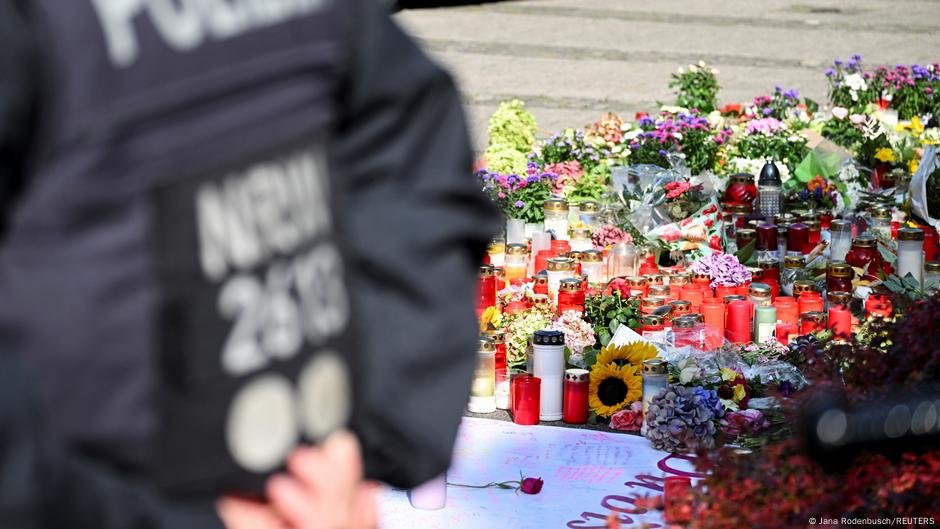The German parliament has given the green light to a new security package but discussions continue over how wide-reaching the measures should be. The package is designed to improve security in Germany, states the government, and includes stricter rules around asylum and migration following a series of deadly knife attacks.
On Friday (October 18) after much discussion, the security package was approved in parts by both houses of parliament. The security package, states the German government, is meant to make Germany a safer place, and includes measures to limit the use of knife carrying, as well as tighter rules around asylum and migration.
German Interior Minister Nancy Faeser described the package as the "correct answer to the current threats to German security, including Islamic terrorism, anti-semitism, and threats from both left-and right-wing extremist terrorist groups," stated a press release from Germany's interior ministry.

The security package includes measures to help Germany "fight irregular migration." These include the possibility of using biometric data to establish the identity of anyone applying for asylum. According to the government, the package "should make it easier to send people back, help strengthen the authorities' fight violent Islamism, and tighten up rules around weapons."
Read AlsoImmigration: What is in Germany's new 'security package'?
Package introduced following fatal attacks
Germany’s new security package was conceived in the summer following two fatal knife attacks perpetrated by suspects who were reported to be migrants, or had had their asylum claims refused in Germany.
Two drafts of new laws were put before both houses of parliament on October 18. The first draft, which aimed to tighten interior security and reform the asylum system, was approved by both houses of parliament (the Bundestag and Bundesrat). The second draft, relating to strengthening Germany’s fight against terrorism, was passed in parliament’s lower house (Bundestag) but not accepted by the Bundesrat (the council of regions). It was blocked primarily by CDU/ CSU leaders who felt the package didn't go far enough.

Payments stopped
Social security payments will be stopped for any asylum seeker who is found to actually be another EU state’s responsibility. According to the Dublin regulation, asylum seekers should apply for asylum in the first EU country of entry and can be sent back to that country if found to be applying for a second time elsewhere. The welfare payments will be stopped in these cases once the EU country has accepted to take back the asylum seeker in question, and when the German Federal Office for Migration and Refugees (BAMF) deems that sending them back to this country is legal and possible.
Any person who has been granted protection in Germany, and then is found to have returned to their own country could also risk having their protection status removed. This will not apply to Ukrainian citizens who have a special dispensation within the EU for both protection status but also are allowed to return to their own country as often as they like.
The German government has also introduced more measures to help it prevent the financing of terrorism, stated the press release.
Read AlsoGermany's new security package is presented to parliament
Knife ban
Under the new laws, there will be a total ban on carrying knives to any public festival, sporting event, fairs, exhibitions or markets and any other public event. There will be exceptions for those who might need a knife for their work, like delivery people, and gastronomic businesses who might be working in these places.
There will also be a ban on carrying knives on buses and trains. Each German state will be handed powers to carry out checks in stations to see if people might be carrying knives. Dangerous flick knives will also be banned.
The German government also said it would be extending the duration of its border controls. On September 9, it confirmed there would be border controls for at least six months on the borders with France, Luxemburg, the Netherlands, Belgium and Denmark. Controls on the borders with Austria, Switzerland, Czech Republic and Poland would also extended.

CDU/CSU calls for stricter measures
On Monday (October 21), the conservative opposition parties CDU/CSU called for even stricter measures to be included in the security package. They said that facial recognition programs and access to saved data should be included in the package.
The CDU/CSU spokesperson for internal security, Alexander Throm (CDU) told the Düsseldorf-based regional newspaper Rheinische Post in an interview on Monday, "we really need to add these measures to the government’s security package, as it urgently requires improvements."
Throm said that his party would do everything it could via an investigation committee regarding the measures to push their recommendations through. The investigation committee (Vermittlungsausschuss) is a tool that the parliament can use when a law has been blocked by the Bundesrat but not in the Bundestag. The committee includes members from both houses and means that they can usually work together to find a compromise on issues that get stuck.
The conservative union is annoyed that the liberal FDP party, part of the governing coalition, had blocked some of the security measures, as the party maintains that personal freedom and data freedom are more important issues.
Read AlsoGermany to tighten asylum laws after Solingen attack – what are the measures?
Conservatives criticize liberals
Throm said that he couldn’t believe the FDP’s behavior, adding that "in times like these where there is a heightened risk of terror, they present a real security risk." He urged the FDP to stop blocking these measures and prioritize an effective security package over data protection concerns.
The critique from the CDU/CSU comes after parts of the security package relating to fighting terrorism were blocked in the Bundesrat by regions governed by the CDU/CSU, who argued that the government's proposals "didn't go far enough."

Hendrik Wüst (CDU), the leader of North Rhine-Westphalia, Germany's most populous state, said that he believed to fight terror effectively, Germany would need to pass measures allowing for saving telecommunications, reported Germany’s tabloid the Bild.
"We have to give our security personnel the tools they need to fight terrorism and root out criminals who are communicating via the internet and social media sites," Wüst told Bild on Monday.
The leader of Bavaria's CSU party and head of the regional government, Markus Söder, criticized the government's security package for being insufficient. In an interview with Bild, he claimed that the proposed laws had been "insidiously watered down." Söder further asserted that the "right conclusions had not been drawn" from the attacks in Mannheim and Solingen during the summer.
Saving data
Yet another CDU politician, Thomas Strobl, who holds the post of Interior Minister in Baden-Württemberg, said that the FDP’s Marco Buschmann, who is also Germany’s Justice Minister, and who had emphasized how important data protection is in Germany, presented "a security risk for Germany."

Although Buschmann says he is sticking by his opposition to relaxing data protection in Germany, he has proposed a so-called "Quick Freeze Protocol," reported the German press agency dpa, by which, data relating to computers and telecommunications can be seized and saved if there is a suspicion that someone might be committing a serious crime (like murder or manslaughter).
By contrast, reports dpa, Interior Minister Faeser favors a measure that would involve being able to save data related to certain IP addresses.
Read AlsoBerlin agrees new security package after Solingen attack
Libyan suspect arrested
On Friday evening, a Libyan man, suspected of planning an Islamist attack on the Israeli embassy in Berlin, was arrested, reported several agencies. The 28-year-old, Libyan was arrested in the German state of Brandenburg (Bernau, not far from Berlin), and is accused of planning an attack with guns, stated German prosecutors.
According to information obtained by AFP, the man had had his asylum request in Germany refused. German prosecutors told news agencies that along with his arrest, they had carried out searches in a property in Sankt Augustin, near Bonn, where his uncle is reported to be living, as well as the man’s residence in Bernau. The uncle was described as "not being suspected of a crime." However, investigators believe that the suspect hoped to flee to his uncle after carrying out his planned attack and then use that to escape abroad.

It is reported that the Libyan suspect had been asked to leave Germany around a year ago. He is reported to have come to Germany in November 2022, and put forward an asylum request in Eisenhüttenstadt in Brandenburg in January 2023. In September that year, the request was reportedly refused. The man is not believed to have appealed this decision.
Government calls on CDU/CSU to lift their block
On Sunday, German Chancellor Olaf Scholz said that given the latest news, he felt it was more important than ever that the Bundesrat passed all the measures that the government had proposed.
Dirk Wiese, the leader of the SPD in parliament, said he also believed that the CDU and CSU’s blocking of the security package in the Bundesrat presents an heightened security risk, according to the Rheinische Post.

The FDP’s General Secretary Bijan Djir-Sarai told the Redaktionsnetzwerk Deutschland (RND) that he hoped the government could propose some updates to the security law, adding to the countries considered "safe" for returns, and also re-defining what a safe country might be.
With AFP, dpa
